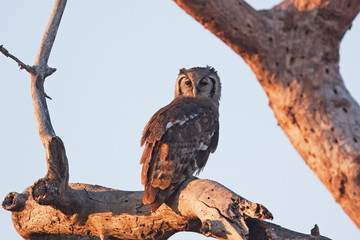ANIMAL: Milky/Verreaux’s Eagle Owl Bubo lacetus Type of Animal: Owl Habitat: Savanna, woodland, open grassland, farmland, riparian areas near rivers and marshes, floodplains, riverine forest, semi-desert, mountains Location(s): Sub-Saharan Africa, except desert & many forests Appearance: Whitish oval disk face w/ black border, dark brown feathers on top, light gray feathers below, female larger than male, juveniles have sootier coloring, distinctive bare upper eyelids. Food/Diet: Mongooses, hedgehogs, rodents, rabbits, hares, bats, hyraxes, bushbabies, smaller owl species, ducks, gamebirds, poultry, crows, nestling herons, smaller birds, frogs, beetles, crickets, goat kids, genets Status in Wild: Stable Conservation: Breeding in zoos & breeding centers Lifestyle: Monogamous pairs, sometimes w/ a juvenile from previous season helping out w/ the young owlets. Sometimes, up to 3 sets of offspring found w/ parents. Additional Info: Called: Male-Cock Female-Hen Young-Owlet Group-Parliament Weight: Male-3.5-4.1 lbs Female-5.5-6.8 lbs Young-9.6 oz Gestation: 1.5 months Height: Male-1.9 ft Female-2.1 ft Body Length: 1.9-2.1 ft Life Span: 20 years in wild, up to 30 years in captivity Main predators are large pythons, crocodiles, lions, leopards, & wild dogs. Largest owl in Africa. Territories often as large as 17,000 acres & defended by loud hoots. They usually nest in hollow trees. Female incubates while male feeds her. Also called “Verreaux’s Eagle Owl” for taxidermist Jules Pierre Verreaux. Sometimes persecuted as predator of poultry & for folkloric reasons. Sexually mature at 3 years old. They often quietly swoop down to take their prey. Nocturnal, but very light sleepers during the day. They have deepest call of any owl (gwok, gwok, gwonk-gwokwokwok gwokwokwok gwonk) often mistaken for leopard call. Fun Fact(s): Pairs known to be aggressively protective of nests & chicks. It is said that seeing an owl during daytime is bad luck. If seen around house at night, death is said to be present.
